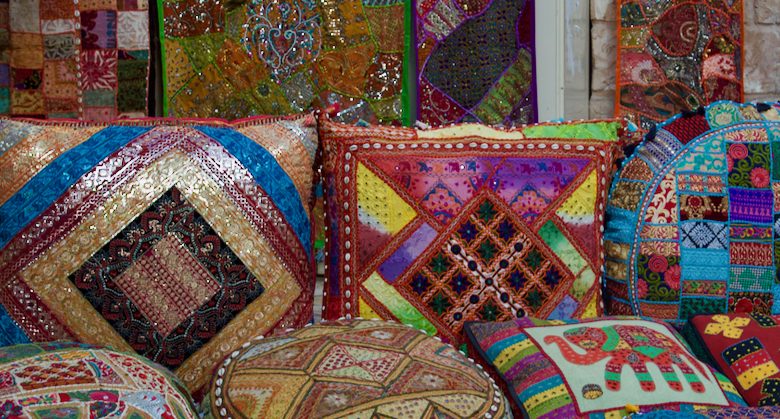THE PHILOSOPHY OF DE-CLUTTERING – PART 1

The world is caught up in a tidying and de-cluttering frenzy – it’s the latest thing in town. There is plenty of different information and ideas available online and from books. I tried the method suggested by Marie Kondo, the Japanese tidying guru, and was pleasantly surprised by the psychological and emotional results they yielded. This article is not intended to teach you HOW to tidy up or fold your clothes, but rather, shares WHY we should seriously think about de-cluttering from an Islamic perspective.
Shopping and hoarding
Most of us actually have a lot more than we need. I was aware of that and consciously cut down on my shopping and continually pared down on my belongings. The de-cluttering method I employed instructed me to gather everything by item type before sifting through them individually to decide what to throw and what to keep. The average person tends to review their belongings once in a while, area by area, cupboard by cupboard or room by room. However, when you gather a single type of item from all around the house and put them in a pile, that is when it is the most impactful because you can physically see everything you have.
For example, starting with clothes. While I thought that I had been scaling back effectively the past few years, it was an eye opener to see how much I still had. I did not realise this because many of the clothes were out of sight, for example, tucked at the back of a cupboard. When all the clothes were gathered from various shelves and cupboards into one single pile, the results were embarrassing. Several versions of a white cotton shirt, more working outfits than I will ever need, and clothes which had been sitting at the bottom of the pile for over a year, crumpled and forgotten. When things are out of sight, we tend to forget them, and keep buying more of the same, and this keeps adding on to the hoard. For example, many hijabis would agree that they tend to buy scarves in their favourite unique “signature” colour, only to discover that they have multiple versions of the same colour already.
We are reluctant to throw clothes out as long as they are in good condition – but what is our intention? There are some who keep their denims and casual clothes for decades even if they no longer fit. Some hope to pass them to their children, but how sincere or realistic is this intention? How many years before the children are even born, what’s more grow into your clothes?
There are some clothes which simply are not suitable for us anymore – our taste has changed, that “special occasion” never comes, our body sizes are different, or the item was bought for a single occasion. Many have put on weight and hold on to their clothes hoping to fit into then again, but for the majority, this will never happen. Sometimes we keep our clothes because of sentimentality: university sweatshirts, company t-shirts and the outfit we wore the first time we met our spouse. We may have pricey clothing which we later find we do not like, but feel guilty giving them away. Sometimes people give us clothes which we have no occasion to wear, but we are too afraid of offending the giver to pass them to someone else. There are a multitude of other reasons why our clothes seem to multiply.
So we hold on to these clothes because we feel guilty for discarding them, and then a few years pass while they are unused and forgotten but need more and more space to house them. Instead of moving into a one bedroom apartment, we need a second bedroom to store the excess clothes. These translate to extra living costs, which can be totally avoided. Apply this to other things – linen, books, magazine, crockery, cooking pots, electrical appliances etc.
Someone mentioned that no matter how rich you are, you can only sleep on one bed. This statement should make us examine our state today. The problem of accumulation affects many of the ummah. This is because our zeal for akhirah has been replaced by the hunger for dunia.
The underlying reasons relate to many diseases of the heart, such as discontentment, envy and greed. We attach happiness to material accumulations, and then enter into rivalry with others to gather more. The Qu’ran has warned us that “Competition in [worldly] increase diverts you.” (At Takathur 102:1)
In Islam, extravagance is a breach of basic Islamic principles. The Qur’an contains many warnings:
“And be not excessive. Indeed, He does not like those who commit excess.” (Al A’raf 6:141)
“O children of Adam, take your adornment at every masjid, and eat and drink, but be not excessive. Indeed, He likes not those who commit excess.” (Al A’raf 7:31)
We do not have to be millionaires to be wasteful – when we spend on things that we do not use, we are being excessive. Many of us shop carelessly, without much thought into what we buy. This is simply because when we shop, we do not set a proper niyyah or intention. We do not incorporate God awareness when we go to the malls. Do we really need that item? Is there something wrong with what we already have? Are we just shopping to kill time? Are we buying it to cure unhappiness? Will we even use it at all after we’ve bought it?
Islam asks us to be moderate in everything, even in our spending. We should not be stingy on ourselves, but we should also not transgress Allah’s boundaries. We should avoid buying things for the wrong reasons – for example, to keep up with the neighbours, or to show off. Extravagance is not limited to the wealthy. It means buying what we do not need and also spending beyond our means. In many countries, people are in deep personal debts, because they buy cars, toys and clothes they cannot afford.
These items will not bring us happiness. They are not a quick fix if you’re feeling down. In fact, they can lead us straight to our destruction, here and in the afterlife. So we suggest that you perform an honest audit of what you have, including those in the boxes that have been unopened for years, and then reassess how you would like to spend your hard earned income going forward. Remember that unless with the right intention, all your dunia possessions are perishable and will not benefit you in the Hereafter. Before that urge to shop, remember:
“Indeed, the wasteful are brothers of the devils, and ever has Satan been to his Lord ungrateful.” (Al Isra 17:27).
This issue is compounded when we continue to hoard our belongings even after we have realized our mistake. In Islam, we are discouraged from hoarding, as evidenced by the following hadith:
Narrated Asma (RA): The Prophet (SAW) said to me, “Do not withhold your money, (for if you did so) Allah would withhold His blessings from you.” (Bukhari)
We are also asked to spend in the path of Allah. However, many of us withhold Allah’s blessings, and when we hoard without putting such things to good purpose, then what use are the possessions for us, dunia and akhirah? The continued stubbornness against parting with our possessions will simply increase our diseases of greed, envy, selfishness and accumulation. We are afraid of parting from our money, and also from parting from the things that we have spent our money on. This is why there are examples of people holding on to old clothes for decades. In extreme cases, hoarding is a sign of mental health issues!
Meanwhile, Shaitan will try to deceive us that hoarding is the same as thriftiness and is beloved to Allah, whereas the opposite is true. Hoarding is symptomatic of stinginess, a trait despised by Allah on no uncertain terms.
“And Allah does not like everyone self-deluded and boastful – [Those] who are stingy and enjoin upon people stinginess.” (Al Hadid 57:23 – 57:24)
If you find yourself being able to relate to the above predicaments, and more importantly, being worried about how your excess things will bear witness against you in akhirah, it is time for a de-clutter. There are many ways to do this. The method I used was the most brutal, where instead of picking out the things I wanted to discard, I picked out only the things that I wanted to keep (in the Konmari methodology, items which “spark joy”). By default, the rest of the items were to be discarded.
In reality, even if we have 100 items of clothing, we keep wearing the same favourite 15 items. The rest are just surplus and are rarely touched.
We don’t encourage throwing things out, because wastefulness is also forbidden in Islam. We suggest that you only throw out what cannot be donated (such as underwear or items which are no longer in good or workable condition). Find someone needy if you can, who would be able to put your items to good use. There are also are many organisations which collect second hand things, so your possessions can be given a new lease of life with another owner. You just need to find a suitable home for them.
It doesn’t matter if the item is pretty or still in mint condition – if they no longer appeal to you, then let them be used by someone else. Trust me, once you have given them away, you won’t miss them. Instead of letting your possessions deteriorate, pass them to someone in need and earn some good deeds along the way.




